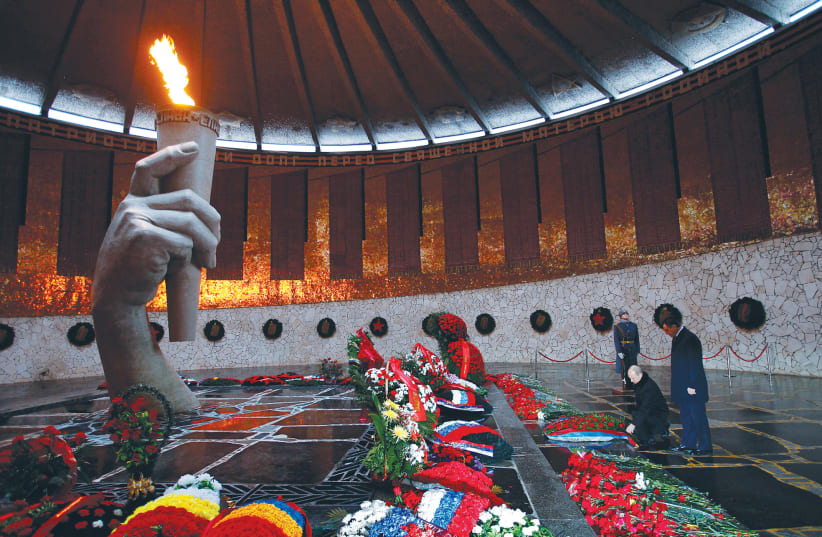Events ignored them. Seventeen days later, Hirohito emerged on American battleship Missouri where he watched his foreign minister and chief of staff sign the surrender instrument that ended World War II, 75 years ago last week.
The question therefore arises: Did Hirohito’s vision of a grand peace ever materialize? And the answer is that while in some senses it did, in the important sense – the moral – humanity is back at square one.
THE GOOD NEWS is that technology has made most of WWII’s bloodbaths unlikely.
An Armageddon involving millions of conscripts atop thousands of tanks, cannons, fighter planes, battleships and aircraft carriers has not happened in the postwar era, and even smaller conventional wars have not happened since the fights Saddam Hussein picked with Iran, Kuwait and the US.
Moreover, WWII’s worst atrocity, the Holocaust’s industrialized murder of millions, would be impossible to administer today. With thousands of satellites owned by a dozen countries scanning the planet incessantly while any child can video anything and transmit it anywhere, strategic voyeurism and retail broadcasting have become such that shipping millions to death camps is impossible to conceal.
Similarly, a propaganda machine like Joseph Goebbels’s would be far less efficient today, because with the advent of email, the Internet and social networks, governments can’t fully control information and narratives, as Iran’s mullahs can attest.
Diplomatically, WWII produced even happier results.
In Europe, an era of peace dawned, one in which its big powers crafted a union that steadily proceeded from economics to politics and from west to east, until half a billion people’s borders became transparent and a unified currency dominated their trade.
In Asia, Japan’s wartime fascism made way for a previously unthinkable pacifism. Not only did the Japanese become major crusaders against nuclear proliferation, they became a hardworking society of antiwar manufacturers and a global leader in foreign aid.
The impression that good things somehow emerged from the worst violence to which mankind ever stooped was bolstered by the aftermath of the Cold War. With war in retreat and liberty rapidly advancing, there was reason to believe that, horrendous as WWII was, it sparked a march of progress and unleashed a spirit of morality that will gradually pacify mankind.
Alas, current events indicate that while WWII’s tools are largely obsolete, the fascist mindset that underpinned it is alive and well.
THE ALLIES’ moral record was problematic from the outset.
Not only was the Nazi tyranny’s defeat spearheaded by another tyranny, Stalin’s, the Allies did not fight fascism until its attacks reached their doorstep. For eight years, which included Japan’s invasion of China, the Nuremberg Laws, Kristallnacht and the Munich Agreement, the free world stood by.
Still, until the turn of the current century there was reason to believe that the world had come to understand fascism’s nature, and that Western-style political freedom, cultural tolerance and international harmony is everyone’s destination, even those unwilling to say so.
Subsequent events proved the world had actually been headed in the opposite direction.
Last century’s steady progression from fascism’s “sacred egoism” to democracy’s “concert of nations” has been halted, and then reversed.
Foreshadowed by the 1989 massacre of Chinese students at Tiananmen Square, freedom’s march was halted in Moscow, in the wake of Vladimir Putin’s rise to Russia’s presidency on the 20th century’s last day.
While Russia and China halted the progression of freedom, Islamism undid mankind’s progression toward tolerance.
The 1990s’ diplomatic optimism, inspired by Mikhail Gorbachev’s felling of the Berlin Wall, F.W. de Klerk’s abolition of apartheid, and Yitzhak Rabin’s delivery of the Oslo Accords – was quelled by the Islamists who waged the September 11 attacks on America, and the suicides’ war on the Jewish state.
Islamist terror struck everywhere – from India, Kenya, Russia and Britain to Canada, China, France and Spain – saying effectively what wartime Germany and Japan told their neighbors: to us – everything; to you – nothing.
That is what fascism is all about, and that is what mankind seemed ready to eradicate as the 20th century drew to a close. It was an era of good feelings that was as hard won as it was short lived.
LAST CENTURY’S fascistic spirits have returned to roam the world, and their demand to shape its future became increasingly loud.
While Islamism attacked the non-Muslim world, major governments fomented international discord.
Russia’s invasion of Georgia, annexation of Crimea, and assistance to Syrian President Bashar Assad’s war on his people indicated that Moscow lost interest in fostering global harmony, and chose instead to throw its weight around.
China followed suit, building concentration camps for Uighurs, scorning fair trade, intimidating Vietnamese fishing boats in the South China Sea and harassing Taiwanese fighter jets above the Taiwan Strait.
Turkey, after shredding its democracy, and after following Iran’s example in fanning Arab civil wars’ flames, is now harassing Greece’s air force and navy, hoping to seize Mediterranean gas this way, much the way fascist Japan thought military bullying was the way to get the oil it didn’t have.
All this is happening while the free world is led by a guy who one day asked whether Finland was part of Russia, and another day told India’s leader “it’s not like you’ve got China on your border.”
Such an ignoramus is obviously unfit to deliver the “grand peace” Japan’s leaders envisioned, and mankind craved, after emerging from history’s worst war. He is, however, a fitting backdrop for the creeping return of that war’s fascist ghosts.
Amotz Asa-El’s bestselling Mitzad Ha’ivelet Ha’yehudi (The Jewish March of Folly, Yediot Sefarim, 2019), is a revisionist history of the Jewish people’s leadership from antiquity to modernity.
